Life at an accounting firm can be pretty hectic. In addition to managing your clients’ books, you need to engage your customers in the right way, identify opportunities for growth, and convert leads.
As your firm grows, how do you stay on top of all that client data? How do you manage customer relationships? And how do you gain insights into customer behaviour and needs? The answer is CRM software.
In this article, we’ll cover:
- What CRM software is
- The benefits of CRM for accountants
- Some of the best CRM systems on the market

What is CRM software?
Customer relationship management (CRM) software helps businesses manage interactions with existing and potential customers.
At its most basic level, a CRM system is like a customer management database that allows you to access customer data easily. But most modern solutions offer additional functionality that covers analytics, process management, and automation.
With a modern CRM solution, you can:
- Store and manage customer and lead data
- Build stronger client relationships
- Understand client needs better
- Streamline and automate repetitive tasks
- Identify sales or lead conversion opportunities
In other words, a CRM solution is an integral part of any accounting firm’s tech stack. It helps you run a more efficient and profitable business while meeting client expectations.
How can accounting firms benefit from using a CRM platform?
While pretty much any business can benefit from using a CRM, accounting firms have unique needs. Unlike some industries where customers typically make one-off purchases and then leave, accounting firms seek to develop strong relationships with their clients over the long term. Here are just some of the ways a CRM can help you do that.
- Improved client communications: With a CRM, you can streamline and automate your communications with clients. For example, you can send timely reminders about upcoming tax deadlines, changes in regulatory requirements, or important industry news. You can also reach out to leads and create a more efficient pipeline.
- A superior client experience: A CRM can help you manage and track all your client communications, preferences, and service history. You can then use this information to offer more personalised services and a superior client experience.
- Increased organisational efficiency: You can streamline and automate key processes, such as scheduling appointments, managing tasks, and tracking billing and payment information. This frees up your staff from repetitive manual processes, enabling them to focus on bringing real value to your firm.
- Better data management: CRMs act as a central repository for all your customer data. This makes it easier to find and use key information, reduces human error, and ensures compliance with the latest data protection regulations.
8 of the best CRMs for accountants
Now we know what CRM solutions are and the benefits they can bring, let’s look at some of the best options on the market. In no particular order, here are our top CRMs for accounting firms.
1. Zoho CRM
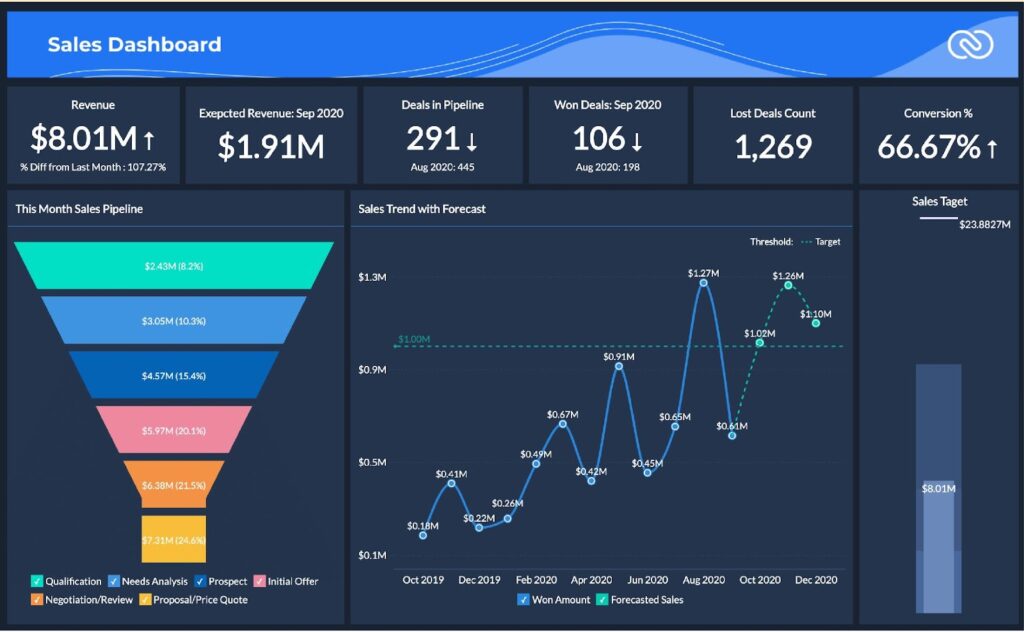
Kicking off our list is Zoho CRM, a popular platform for accountants and bookkeepers at both small and large firms. It enables businesses to maximise productivity, build better customer relationships, and make more data-driven decisions.
Zoho CRM is also well-known for its seamless integration with other third-party apps, including most accounting software. Its key features include:
- Lead management, with automated lead scoring
- Deal management that allows you to prioritise, track, and monitor your sales pipeline
- Automated workflows that reduce manual work
- Multichannel contact management
- Detailed analytics to drive smarter decision-making
Pros: A variety of pricing plans to suit accounting firms of all shapes and sizes. Users also enjoy the rich customisation options that allow you to build personalised fields, layouts, and automation flows.
Cons: Some users call out Zoho CRM’s steep learning curve that can overwhelm new users.
2. Salesforce
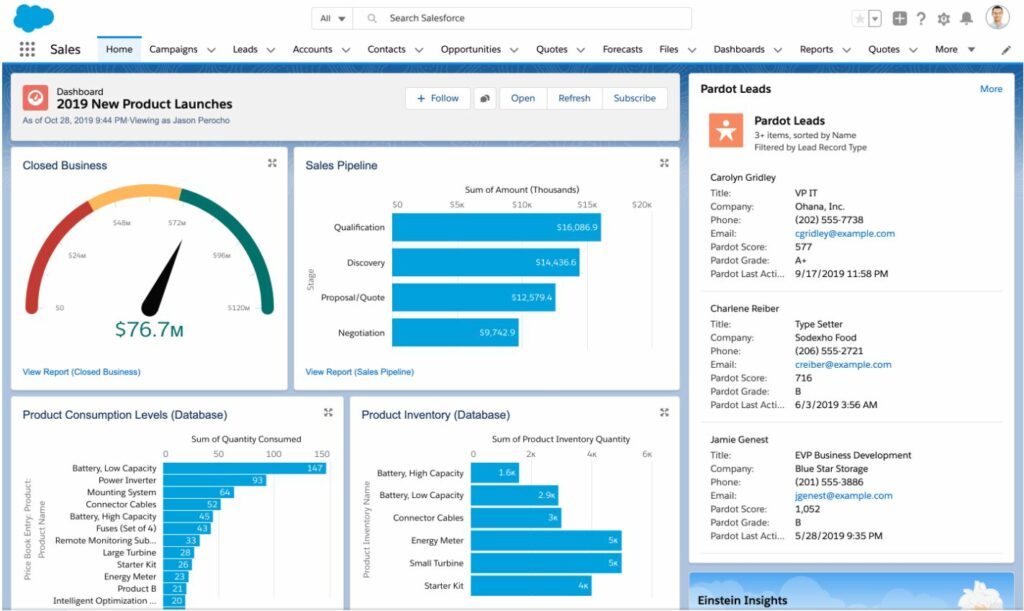
A name that pretty much everyone will know, Salesforce is a monster in the CRM space. It’s the current market leader, accounting for a third of the global CRM market. So they must be doing something right.
Salesforce offers extensive sales and client management features. Unsurprisingly, it’s used by a staggering 73% of sales professionals. That said, its rich feature list and automation capabilities make it a strong choice for accounting firms as well. Salesforce’s key features include:
- Lead management
- Account and client management
- Pipeline and forecast management
- Workflow automation
- Customisable reports and dashboards
- Mobile app for access on the go
Pros: Salesforce allows you to manage pretty much all of your internal operations. But it’s particularly strong at sales management and turning prospective clients into paying customers.
Cons: Some users think that Salesforce has a slightly outdated look and feel compared to its competitors.
3. Hubspot
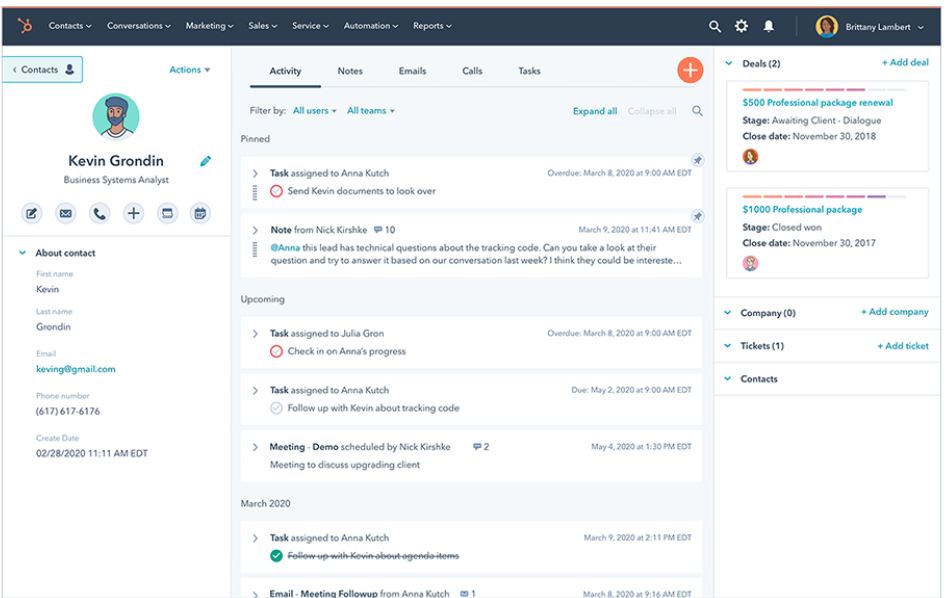
Another big name on the list, Hubspot is a CRM that helps businesses build stronger relationships with their clients, engage new leads, and manage their pipelines more effectively.
Perhaps the biggest perk Hubspot offers is a completely free CRM tool. As you’d expect, it offers a limited number of contacts, integrations, and features. But it’s still a great product for anyone on a tight budget.
Hubspot also offers a paid CRM called Hubspot Sales Hub, which offers a much broader range of features, including:
- Advanced analytics and reporting
- Email and call tracking
- Document management and tracking
- Sales automation
- Conversation intelligence and AI-powered insights
Pros: The free version is a great place to start for most small businesses. The paid version is powerful yet easy to use.
Cons: The paid version can get expensive. The more marketing contacts you need it to handle, the more you have to pay.
4. Pipedrive
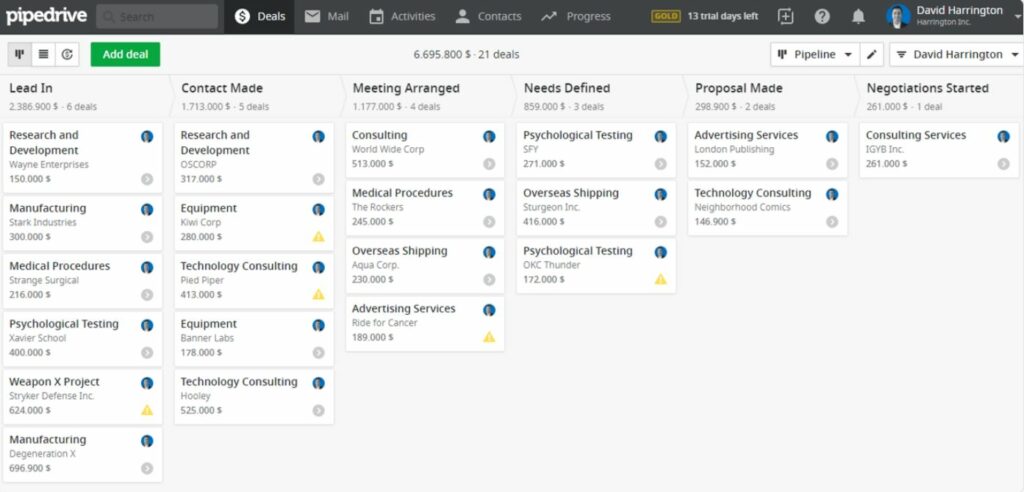
With over 100,000 customers across 179 countries, Pipedrive is another big-hitting CRM. While it’s designed to handle the sales side of customer relationship management, it’s also a solid choice for accounting firms.
As the name suggests, Pipedrive focuses primarily on the sales pipeline. It provides a visual representation of where your leads are on their sales journey. This allows you to make smarter decisions that push them through the funnel. Key features include:
- Lead and deal management
- Email tracking and communications
- AI-driven task automation
- A range of powerful third-party integrations
- Customisable reports and insights
- Mobile app
Pros: An straightforward tool for accounting firms that want extra visibility into their sales funnel.
Cons: Not the most customisable CRM for accountants, and perhaps more basic than some competitors.
5. Freshsales
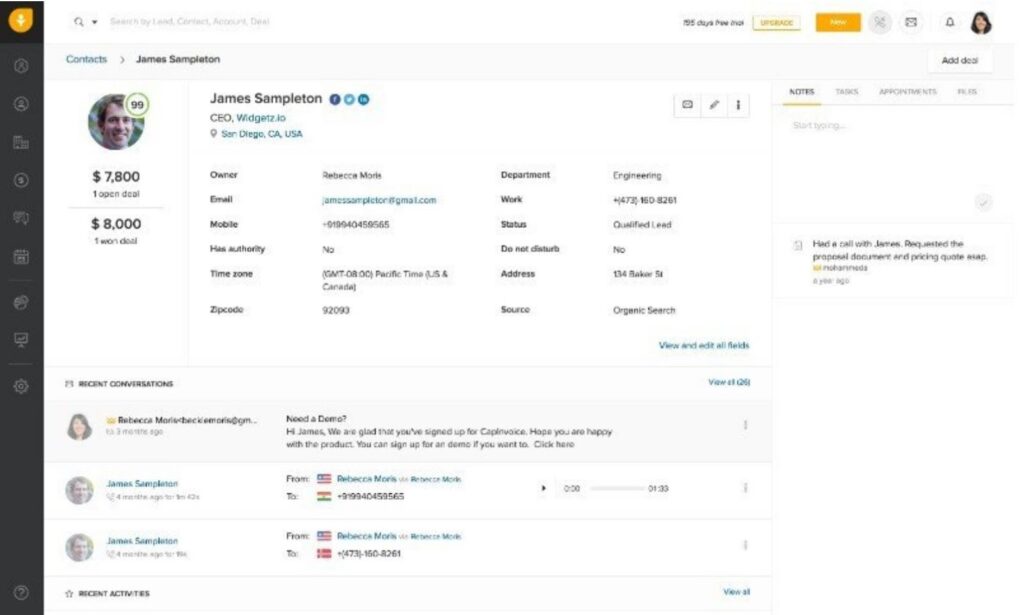
Part of the Freshworks software suite, Freshsales is a cloud-based CRM that provides advanced lead and contact management tools. It also integrates with a host of popular accounting software, making it a solid choice for accounting firms.
Freshworks is designed to help you shorten your sales cycle and accelerate your revenue. Its key features include:
- Automated sales processes
- AI-powered insights that help you close sales faster
- Customisable web forms to capture client data
- Web analytics, allowing you to understand visitor intent
- AI chatbots that engage customers in real-time
Pros: Customers enjoy Freshsales’ intuitive UX and user interface, making it a relatively easy tool to pick up and play with. Seamless integrations with other Freshworks tools allow you to massage sales with support in one place.
Cons: Some reviews have called out the sub-par technical support available at times.
6. Copper
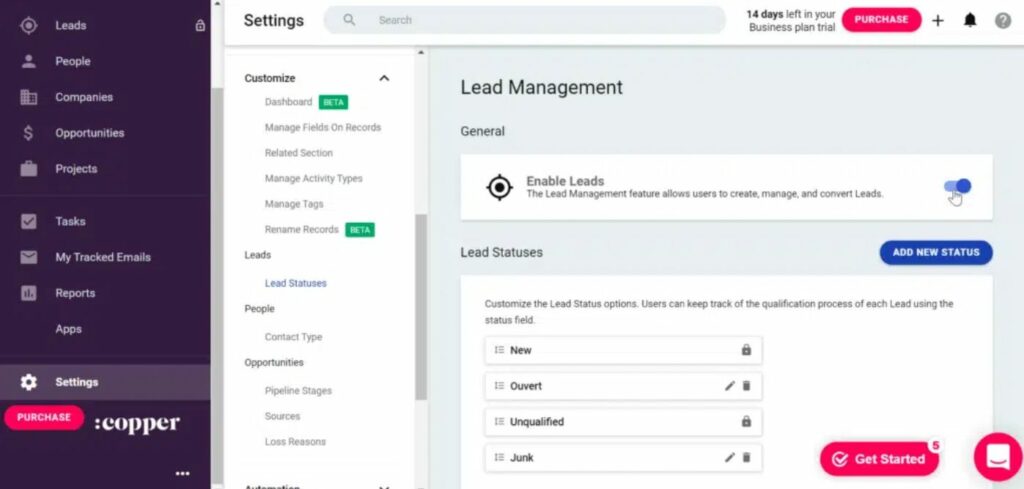
Described as a CRM with zero learning curve, Copper is designed to simplify the way businesses interact with and manage customers. It’s a rising star in the CRM space, with 30k businesses using it across the world.
Copper is also built with Google in mind, offering seamless integration with all G Suite tools. This makes it appealing to accounting firms that rely on Gmail, Google docs, Google Calendar, and other Google tools. Key features include:
- Sales and pipeline management
- Automated reminders help you reach out to the right clients at the right time
- G suite integrations automatically sync your communications and calendars
- Customisable pipelines, projects, and processes
- Integrations with Slack, DocuSign, Quickbooks, and many more
Pros: Copper is ranked #1 in “Payback” on G2, meaning it has the shortest time to ROI. This is thanks to its simplicity and ease of use, which allows users to get up and running fast. A standout choice for Google users.
Cons: According to one review, the number of integrations you have access to is dictated by the number of users you pay for. So small teams may find their options limited.
7. Monday.com
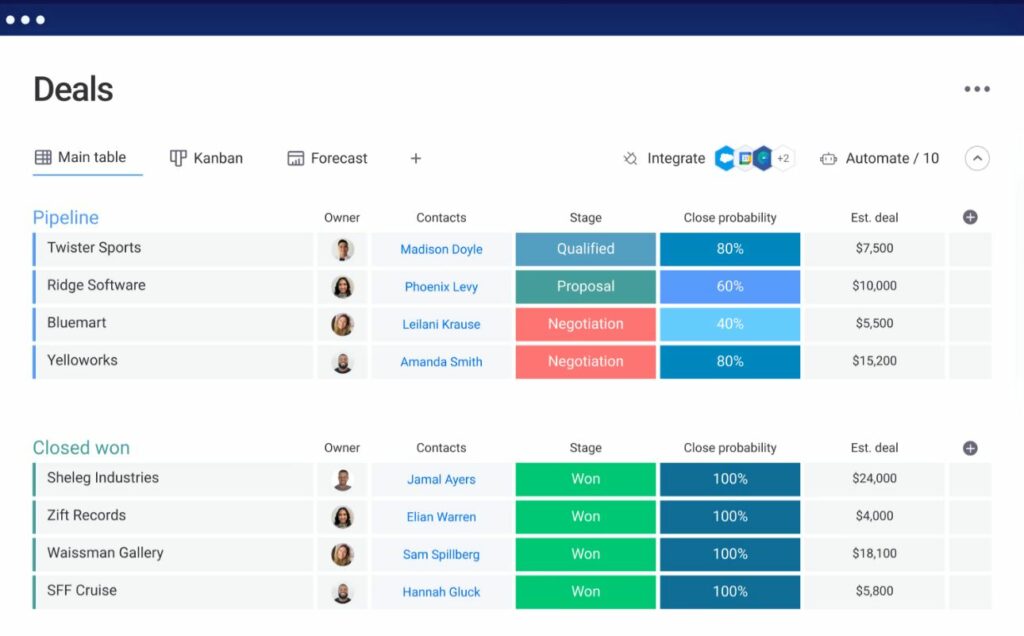
Monday.com is another big name in the workplace software space. They offer a CRM platform that sits alongside their popular work management system. This allows accounting firms to manage their clients and leads alongside their projects, tasks, and workflows.
With some of the highest user ratings you’re likely to see, Monday.com is clearly a quality product. Unsurprisingly, they were voted one of the top Global Software companies of 2023 on the review site G2. Monday.com’s CRM tool allows you to:
- Capture, manage, score, and qualify leads
- Track performance, pipelines, and targets
- Sync sales emails
- Manage client relationships and customer data in the one place
Pros: When combined with Monday.com’s work management platform, this CRM becomes a complete system for managing all your internal workflows and processes.
Cons: Some customers mention that while it’s an excellent tool, Monday can be expensive. Others say that there’s a steep-ish learning curve for those not familiar with this type of tech.
8. Insightly
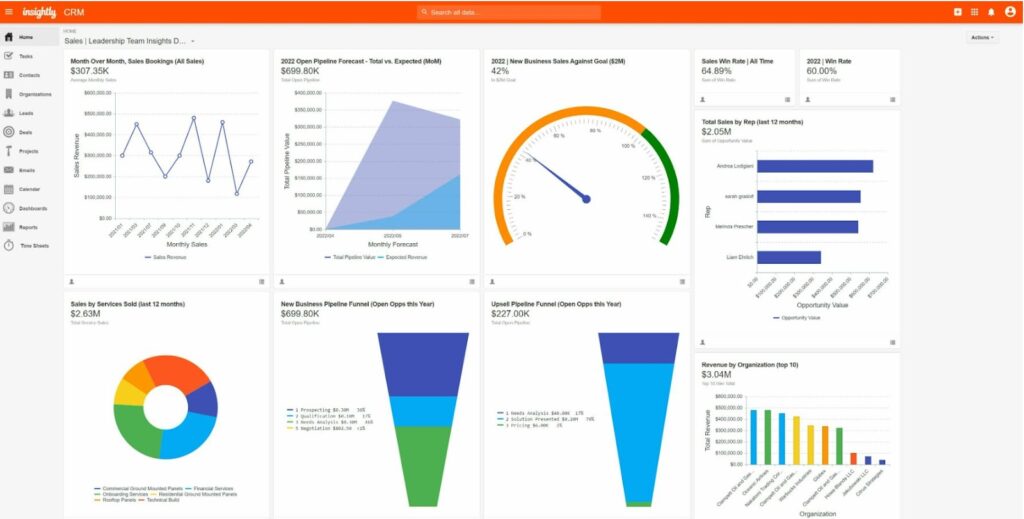
Last but not least, Insightly is a suite of software tools spanning sales, marketing, and customer service. Their integrated CRM platform is an excellent choice for small businesses. When used alongside other Insightly tools, you can enjoy business-wide insights and efficiencies.
One of Insightly’s biggest plus points is its AppConnect platform, which allows you to build integrations with pretty much any third-party tool quickly and easily. This way, Insightly acts as a central hub for all your accounting processes, workflows, and data.
With the Insightly CRM, you can:
- Build a sales pipeline, manage leads, and win opportunities
- Increase productivity through automated and scalable processes
- Create price books and quotes to bring clarity and transparency to the sales process
- Manage projects and tasks
Pros: Insightly is known for being easy to use. Its ability to integrate with your existing tech stack makes it a powerful CRM for accountants.
Cons: While Insightly covers a lot of bases, the software suite doesn’t have a native tool for building web forms.



